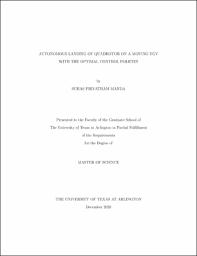
ATTENTION: The works hosted here are being migrated to a new repository that will consolidate resources, improve discoverability, and better show UTA's research impact on the global community. We will update authors as the migration progresses. Please see MavMatrix for more information.
Show simple item record
| dc.contributor.advisor | Lewis, Frank L | |
| dc.creator | Manda, Suhas Priyatham | |
| dc.date.accessioned | 2020-12-22T20:13:41Z | |
| dc.date.available | 2020-12-22T20:13:41Z | |
| dc.date.created | 2020-12 | |
| dc.date.issued | 2020-12-01 | |
| dc.date.submitted | December 2020 | |
| dc.identifier.uri | http://hdl.handle.net/10106/29632 | |
| dc.description.abstract | This thesis proposes an offline method that uses an integral reinforcement learning (IRL) technique along with the system identification to determine the optimal control of a system with completely unknown dynamics. Unmanned aerial vehicles (UAV) that are particularly deployed to track and land on an arbitrarily moving unmanned ground vehicles (UGV), demand a high performance controller to perform precise tracking. One way of designing an optimal tracking controller is developing linear quadratic integrators (LQI) with a quadratic type of cost function that solves Riccati equation. However, this approach requires prior knowledge of the linearized UAV system dynamics. We overcome this problem by employing an IRL technique that solves LQI through system identification. Usually, IRL techniques adopt a conventional way of solving the Hamilton–Jacobi–Bellman (HJB) equation with value function approximation. The proposed approach evaluates the optimal control using IRL that solves the HJB equation using system identification instead of value function approximation. Assuming that the UAV system dynamics are linear time-invariant over a particular flight condition, we identify the linear model by analyzing the input and output data samples from a linear regression perspective, where we use the conjugate gradient descent optimization algorithm. This approach addresses the challenge to compute optimal control without the need to know UAV dynamics. We have rigorously tested and simulated the proposed method on various flight trajectories. The test results have shown significant improvement in the control policy over each iteration of IRL. After validating the proposed method in simulation, we have implemented this approach on a real UAV to track and land on a UGV. | |
| dc.format.mimetype | application/pdf | |
| dc.language.iso | en_US | |
| dc.subject | Integral reinforcement learning (IRL) | |
| dc.subject | Quadrotor | |
| dc.subject | UAV | |
| dc.subject | UGV | |
| dc.subject | Hamilton–Jacobi–Bellman (HJB) | |
| dc.subject | Linear quadratic integrators (LQI) | |
| dc.subject | Value function | |
| dc.subject | Riccati equation | |
| dc.subject | Conjugate gradient | |
| dc.subject | System identification | |
| dc.subject | Optimal control | |
| dc.title | Autonomous landing of quadrotor on a moving UGV with the optimal control policies | |
| dc.type | Thesis | |
| dc.degree.department | Electrical Engineering | |
| dc.degree.name | Master of Science in Electrical Engineering | |
| dc.date.updated | 2020-12-22T20:13:45Z | |
| thesis.degree.department | Electrical Engineering | |
| thesis.degree.grantor | The University of Texas at Arlington | |
| thesis.degree.level | Masters | |
| thesis.degree.name | Master of Science in Electrical Engineering | |
| dc.type.material | text | |
| dc.creator.orcid | 0000-0003-2846-9743 | |
Files in this item
- Name:
- MANDA-THESIS-2020.pdf
- Size:
- 2.259Mb
- Format:
- PDF
This item appears in the following Collection(s)
Show simple item record


